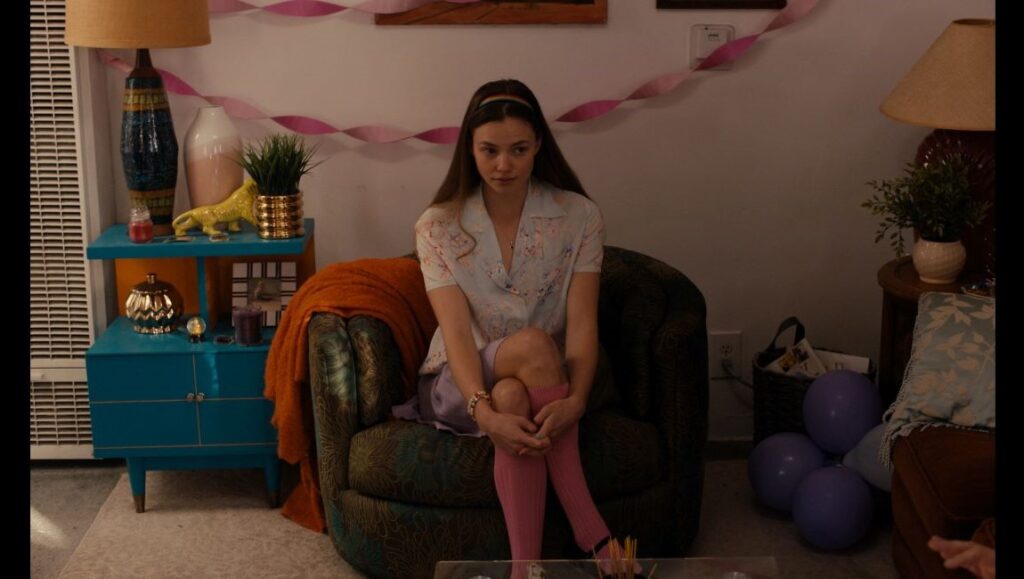Sharp Stick
Though she’s been away from the film festival circuit for 11 years at this point, there’s no doubt that the career path Lena Dunham charted — from SXSW film premiere to HBO series deal in less than a year — inadvertently set off a dramatic reconsideration of the function of North American fests. The Dunham template quickly became the ideal for many young, American independent filmmakers, and festivals readily accommodated, focusing programs towards developing talent with pay cable and streaming TV in mind (a philosophy promoted rather actively by the Duplass Brothers). It’s an understandable safeplay in a culture that doesn’t care about movies much anymore, but one that has basically gutted the American independent film scene of any formal style, prioritizing persona and dialogue-centric screenwriting above all. Which is something of a shame, as Dunham’s 2010 feature Tiny Furniture, while surely divisive from a humor perspective, is at least quite obviously a film, crafted with the medium specifically in mind. That project had a cinematic conciseness to complement its creator’s sharp voice, something that her monumental follow-up series Girls generally strived for, but usually lost sight of while pursuing narrative tangent. And so, Dunham’s return to filmmaking (and Sundance debut) was always going to be a loaded text in several ways, but at least her return to cinema brings with it a vision committed to it’s particularities.
Sharp Stick, the third feature written, directed by, and starring Dunham (although in more of a supporting turn this time around), is indeed a more specific work than much of what has come out of Tiny Furniture’s wake, yet it’s hindered by an awkward, shaggy structure echoing some of her lesser writing tendencies from Girls. Initially aiming to disorient, Sharp Stick opens on Taylour Paige in tight close up, capturing her as she twerks and dances for TikTok, a small, meek white girl filming her from the corner of the room. It’s a mischievous, near trollish opening for a director whose work has been so closely affiliated with whiteness (and whose attempts to subvert this perception have never gone off), but curiously, it doesn’t really build into a throughline, its strange tension dissipating once Dunham’s script begins to fill in context. Not such a bad thing in this case, but this becomes something of a recurrence with Sharp Stick, a rather unslick bit of screenwriting that, while heartfelt, gets away from its author with some frequency. We soon learn that Paige (playing Treina) and the girl filming her are sisters and that the “girl” is in fact a 26-year-old woman by the name of Sarah Jo (Kristine Froseth), the both of them living together with their lapsed socialite mother (a perpetually stoned Jennifer Jason Leigh). Totally guileless and childlike, Sarah Jo’s life primarily revolves around her family and her job as an au pair for a miserable millennial yuppie couple (Dunham and Jon Bernthal, the highlights of the film) until she quite suddenly and uncharacteristically begins sexually purusing the husband. From there, Sarah Jo embarks on a journey of sexual self-discovery after years of repression born from severe medical trauma, but Sharp Stick’s narrative flows in strange ways, ultimately moving far past the confines of the Bernthal/Dunham household and venturing out into a porn-fueled cosmic odyssey. As previously suggested, these plot leaps are more ambitious than elegant, but Sharp Stick’s cast does their best to keep up, and some of the grander moments are brought to life convincingly by former Josephine Decker DP Ashley Connor’s camera. As for Sarah Jo, Dunham’s protagonist (obviously a little bit her) often confounds as both a triumphantly honest figure and something of a bizarre sociopath, but of course, this is this director’s favored territory. And while Sharp Stick doesn’t offer it’s cleanest realization, it certainly manages to distinguish itself from much of what it’s up against.
Writer: M.G. Mailloux

When You Finish Saving the World
Actor Jesse Eisenberg seems to be playing right into his on-screen persona as an insufferable narcissist with his feature directing debut When You Finish Saving the World, which is about two or maybe even three of them, while simultaneously doubling as an excruciatingly old-man-ish take on youth wokeness. Based — and I can’t believe I’m typing this — on an audio drama Eisenberg made in 2020, it’s as absolutely ostentatious and irritating as that genesis suggests.
Young Ziggy Katz (Finn Wolfhard from Stranger Things… see, I told you this was irritating) is an aspiring streaming star, beaming his terrible, tin-eared songs (which he describes as “classic folk rock with an alternative influence”) out into the Internet ether for consumption by his alleged 20,000 followers. He also conspicuously wears his own merch everywhere. Meanwhile, his mother Evelyn (Julianne Moore), also completely self-absorbed, runs a women’s shelter and has developed a fixation on young teen Kyle (Billy Bryk), the charming and guileless son of one of the shelter’s occupants. Her attempts to do some surrogate mothering here are, of course, in contrast to her contentious relationship with Ziggy, to whom she can barely be bothered to relate despite their shared fixation on being congratulated all the time.
Things get even more complicated when Ziggy develops a huge crush on classmate Lila (Alisha Boe), a burgeoning young leftist activist who routinely chastises her peers for being insufficiently radical, which is pretty rich considering her main activity is writing awful protest poems to spread “awareness.” Ziggy dedicates himself to learning her preferred talking points to impress her despite having little to no interest in the issues themselves.
Eisenberg seems to think he’s made a film that balances its characters’ acidity with some understated bittersweetness, but mostly his critique of their narcissism and cluelessness just makes them seem like assholes. We’re meant to clock that Ziggy and Evelyn are failing each other, but at a certain point it’s not worth caring about. Everyone’s preoccupation with their precious ideology never once feels like a genuine desire to be moral, which makes the film’s assessment of it as facile seem like just one more soft target. Wolfhard is properly excruciating in the role, but he also plays Ziggy like a complete dope, so he just seems like a cipher. And it’s hard to decide which is worse: casting Moore as this white liberal shrew or that she agreed to do it.
It’s also visually tepid, full of bummer autumnal browns and grays, alternating between boring handheld and endless, inexplicable slow zooms, which give it that A24 sheen and not much else. It’s as grating as movies get; perhaps the only successful irony in the entire endeavor is that Eisenberg, of all people, played completely to type in asserting these particular pretentions.
Writer: Matt Lynch
Brainwashed: Sex-Camera-Power
While made largely in response to the Me Too Movement — and, more specifically given the topic, the public recognition of decades-long sexual abuse in the film industry — which gained prominence only five years ago, Brainwashed: Sex-Camera-Power already feels considerably outdated as it begins to enter the festival circuit. This could be due to the circumstances of the project’s inception, its origins dating back to 2017 as an illustrated lecture delivered by filmmaker and CalArts instructor Nina Menkes, now adapted into a feature-length documentary with film clips, interviews, and Menkes’ own talk constituting the bulk of the runtime. But the core of what she’s been arguing — that Hollywood entertainment has primarily catered to a cis, heterosexual, white male audience, reflecting the business’ chauvinistic hiring practices — remains as true now as it was then, despite some posturing done to make the entire endeavor seem “dangerous” from the jump (an ominous opening voicemail making vague threats of “ending things” attempts to animate atmosphere). If anything, a contemporaneous cinematic interpretation should serve as a timely reminder of how little progress has been made in the grand scheme of things, even if the end results would always prove to be formally listless given the original medium by which these ideas were first presented (a public speech was never the most inherently filmic event in the first place).
But these broader systemic contentions are all attached to a reductive thesis that would have been cutting edge in the 1970s, made even clearer by the heavy Laura Mulvey worship that infiltrates the doc’s first leg — with the phrase “male gaze” awkwardly crowbarred into each talking head soundbite afterward — and a theoretical framework that could be charitably characterized as “second-wave.” It’s the basics of what you’d come to expect from this sort of thing: who’s doing the looking in movies, especially in commercial cinema? Males. Who’s being looked at? Women, who are objects to be looked at, to be acted upon. This is obviously a perfectly valid (if far too binary) lens by which one can experience any piece of art, one which opens new avenues for inclusive discourses, but one that even its staunchest advocates would practice with far more attentive nuance than what Menkes provides. It’s not what she’s arguing, but how she’s arguing it, explicitly seen with both her selected targets, ranging from ones that suggest she’s willfully missing the point — Alfred Hitchcock, Brian De Palma, and Orson Welles made films about obsession and oppression, color me shocked — to the obvious lowest of low-hanging fruit (Barbarella and Adam Sandler comedies), and her regressive, often contradicting and cringe views involving topics such as on-screen nudity and artistic intentionality.
She claims she isn’t trying to be the “sex police,” but it often seems that way with how little she allows even female filmmakers to display in their works. Titane gets a slap on the wrist for the supposed objectification of its lead protagonist, and Sofia Coppola’s accused of pedaling sexist tropes with the opening shot of Lost in Translation; yet, Cheryl Dunye gets a pass for her explicit sex scenes? Cuties is dismissed because attempting to reclaim or subvert the male gaze would only reinforce its preponderance, but Promising Young Woman is patted on the back for the same exact reason? Maybe that’s because Menkes doesn’t provide the proper context for either work, as is the case with most other films discussed as she fails to build her arguments on cogent reasoning (there’s a Cinema Sins-esque gotcha aimed at Raging Bull’s audio mixing that’s especially unconvincing). Even when she does, like when she explains how a long take of Brigitte Bardot’s derriere from Jean-Luc Godard’s Contempt is satire, it’s waved off as irrelevant; intention, so it seems, is negligible in art discourse nowadays.
The biggest point of confusion comes with a few bad-faith attacks on Kathryn Bigelow, who’s accused of selling out — based on her film’s masculine sensibilities, obviously selected due to internalized self-hatred — and called out for The Hurt Locker’s all-male lead crew, a criticism that feels especially short-sighted given the documentary’s starting premise of pervasive institutional sexism within Hollywood. She’s not even properly given her due as the first woman to ever be awarded Best Director at the Academy Awards, since she doesn’t fit into the narrow confines of Menkes’ model — praise is, instead, bestowed upon Chloé Zhao — and is subject to more scrutiny than the entire Marvel machine (though that’s probably because this performance was recorded at The Walt Disney Theater, while Brainwashed credits three different executive producers who carry the Disney family name). In fact, the filmmaker Menkes has the most praise for is, strangely enough, herself, as she references three (?!) of her own films and highlights their merits with deliciously off-handed praise (funniest line of the year, hands down: “For Tarkovsky lovers, you’ll notice my homage”). But despite their inclusions being grossly self-promotional, Menkes’ films are at least able to reach a certain platonic ideal of women’s liberation that Brainwashed feels incapable of ever really properly articulating.
Writer: Paul Attard

Watcher
Horror inspired by the unique voyeurism of apartment-living and being a stranger in a strange land is nothing new, and with Watcher, director Chloe Okuno attempts to pull these well-worn tropes into the 21st century. The story follows Julia (It Follows star Maika Monroe), an idle middle-class wife transplanted into Romania, a country where she has nothing to occupy her time and does not speak the language. In the face of all this boredom and loneliness, Julia develops an obsession with a man in the neighboring apartment building (Burn Gorman), who she believes is watching and stalking her. Becoming increasingly concerned for her own life and convinced that the man is a serial killer, Julia begins stalking him across the streets of Bucharest in return. Instead of relying on any digital gimmicks or commentary on surveillance culture, Okuno keeps things simple, constructing a relatively simple cat-and-mouse dynamic between Monroe and Gorman.
Drawing on aesthetic and thematic predecessors like Rear Window and Rosemary’s Baby for some of its character dynamics — specifically the voyeurism of the former and the character types of the latter — Watcher is certainly a film that is aware of its own ancestry. However, for all that understanding, and Okuno’s confidence in incorporating successful elements of recognizable films, Watcher ends up a pale imitation, unable to bring any necessary originality to a film niche with such big shoes to fill. While Watcher largely succeeds according to its technical craft, with evocative cinematography and remarkable performances from both Monroe and Gorman, the script simply doesn’t drive the film in any particular direction, its lack of anchor leaving it to feel entirely shallow. Still, that’s not to say it’s devoid of potential — Okuno does hit on some particularly interesting subtext. There’s the implication of the film’s title, which suggests Julia’s role as watcher and the ways in which this might empower the object of voyeurism by flipping the power dynamic on its head. And then there’s the (all-too-brief) study of Julia’s own power in the situation, hitting on both contemporary considerations — an affluent white woman whose tears could lead to lasting consequences for those she accuses — and more classical ones — a working-class man who feigns innocence by leaning into interpretations of Julia as a hysterical woman. Throughout, such appealing discursive tendrils creep at the edge of the script, but they are never explored enough to fully elevate the film from retread status.
But in fairness to the genre, we understand that thematic weaknesses can sometimes be forgiven if the work accomplishes the simple job of all horror films: is it scary? Despite a few choice moments that draw on the everyday, specifically gendered fears of being alone with a threatening man with no resource or help — such as in a climactic scene where Monroe and Gorman are alone together on a stalled underground train — Watcher is disappointingly void of much tension. Part of this is again thanks to deficiencies in the script, which feels too rooted in familiar, formulaic territory to unsettle much, but it’s perhaps in greater part due to the double-edged sword of Gorman’s casting. The actor is no doubt chilling as the watcher, at once sinister and disarming, a figure who evokes fear even in silhouette. But the role comes at but the latest in a long run of nasty roles for Gorman, from a Nazi bomber in Imperium to a rapist-murderer in Game of Thrones and a homophobic dirty cop in And Then There Were None, to name just a few. Sticking to such typecasting means even the more deceptive, cunning elements of Gorman’s performance, intended to put the audience at odds with Julia’s perspective, are nullified. From his first moments on screen, it’s hard to envision Gorman as anything other than what Julia perceives him to be — a vile, violent figure — and without any aid from the script, Watcher is left to anticlimactically stumble into becoming the worst thing a horror-thriller can be: predictable.
Writer: Molly Adams
We Met in Virtual Reality
Joe Hunting’s debut feature film We Met in Virtual Reality is shot entirely inside VRChat, a social, virtual-reality world-building video game. His previous film, the compact 13-minute A Wider Screen, had a similar conceit but featured footage of people in real life: a major mistake. He rectifies that here, and the ultimate joy of this feature is how it never removes the viewer from the epistemological reality of those onscreen. We have no idea what any of these people look like, what age they are, or what their professions are in “real life”; they’re only represented by their 3D avatars, which range from robots and catgirls to Pokémon and a hotdog. This all may appear silly on the surface, but it becomes increasingly evident across the film’s 90 minutes that any distancing created via virtual spaces and self-chosen presentation allows for intimacy and authenticity; in the film’s most touching moments, the utter sincerity of everyone’s intentions feels utopian.
Such a claim can certainly sound nauseating in the wake of Mark Zuckerberg’s metaverse, but the beauty of VRChat has been obvious for some time. It’s been three years since an emotional video of VRChat footage — one involving a boy sharing his experiences with bullying — went viral, and much of We Met in Virtual Reality feels like a feature-length exploration of such vulnerability and thoughtful listening. As viewers, we’re often meant to simply observe and hear their stories. As the film begins, we’re dropped in media res at a bar, indistinct chatter filling the room. Soon, we watch as a community meetup leads to people entering a new world someone has created, one that involves driving around a scenic landscape. As War’s “Low Rider” plays in the background, we watch as someone who can’t drive in real life enjoys the thrill of gallivanting alongside friends. The joy is palpable even secondhand.
Indeed, community is at the core of Hunting’s film, which is heightened by an understanding that this footage was captured during the pandemic. We learn about a group of people who teach sign language to others, and how actual classes are taught every day of the week. Later, a deaf person details their personal experiences with their disability and VRChat. These large-scale portraits are where the film is most successful: alongside sign language classes, there are belly dancing seminars and improv comedy performances. The more confined moments, like when we watch people detail their monogamous romances, are more rote, but even they prove stirring when the film extends a relationship outwards; in one scene, we hear a tears-filled Maid of Honor speech during an in-game wedding.
We Met in Virtual Reality is, importantly, nothing like a Twitch stream: the camera angles, zooms, and framing are always thoughtful, bringing legitimate filmic qualities to the proceedings. And in many ways, it’s more of a traditional documentary than anything else, even channeling a certain Wiseman quality at times; as Hunting moves between varying spaces, his editing creates connections between different sectors of the game world. Of course, VRChat itself is imperfect — avatars regularly overlap and movements aren’t always clean — but it’s this inexactitude that mirrors the film’s authenticity. It’s obvious to everyone that none of this is happening in the real world, and that some of this is even absurd, but that only highlights both the film and VRChat’s greatest quality: it allows for every emotion and conversation to have depth, where everything can feel more real than the performance of life outside VR.
Writer: Joshua Minsoo Kim

Neptune Frost
Saul Williams & Anisia Uzeyman’s Neptune Frost is tethered neither to this world nor entirely apart from it. It’s both a queer film and an anticapitalist, anticolonialist one, and in its shape, it recalls science fiction narratives like The Matrix and Dune, but takes its own form as an Afrofuturist musical. It alternates between languages, between realms, between dreaming and waking, and between tones, and the visual palette mirrors this oscillation throughout as well, reflecting different moods and developments.
Produced in Rwanda, Neptune Frost is set in motion when Matalusa’s brother Tekno is killed by a boss while mining for materials used to build electronics. Matalusa then meets and falls in love with intersex hacker Neptune, played by both Cheryl Ishega and Elvis Ngabo, and they become part of a collective called MartyrLoserKing (also the name of Williams’ 2016 album in which he began to explore some of the themes present in the film) and begin resisting the society that is working to marginalize them — as members of the working class, as people of color, and as people who live outside of the West. Other characters filter in and out through various songs and segments, though it’s rarely clear how they affect or reflect the narrative.
More essential here is the ethereal music, composed by Williams, which matches the film’s techno-psychedelic imagery; it emerges from and then in turn shapes the diegesis of the film. None of the songs feel forced or out of place, and though most of them aren’t especially melodic, they successfully establish a mood and communicate the emotions of the characters. Neptune Frost’s unique costuming likewise stands out — during daytime scenes, they can be seen to incorporate computer parts, while during nighttime sequences, the neon lighting transforms them into something else entirely. These techno-centric visuals are also incorporated into the set design and the VFX, with some of the most memorable images including a man who flies using bicycle wheels as wings, wire face masks used to identify military members, cloaks made of computer keyboards, and a traditional string instrument that creates electronic music.
Though Neptune Frost’s plot is sparse and sometimes unclear, the film is not one that necessarily needs or wants to be plot-forward. That works out mostly fine, but unfortunately, despite its inviting technical craftsmanship, it does sometimes feel lacking in energy and propulsiveness. The performances, for their part, are engaging enough, but they lack the specificity of the direction and set design; most characters operate more as symbols and images than as fully-formed people, and it’s a particularly frustrating development for a movie with so much (successful) going on to fail to engage across the board and throughout the runtime. Still, its chosen thematics — gender, colonialism, technology — are richly explored, and so, despite sometimes lacking in coherence, Neptune Frost remains a worthwhile oddity on the strength of its formal expressions and its bold, novel exploration of a multitude of ideas.
Writer: Jesse Catherine Webber


Comments are closed.